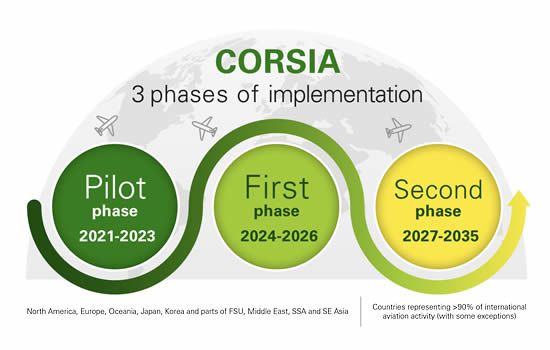Sarah Douet, bp’s low carbon trading originator, and bp’s CORSIA expert, shares how Air bp’s customers will be impacted by CORSIA and how we can support our customers on their journey to comply with the scheme’s mandate to address international aviation emissions through the supply of eligible SAF and carbon offsets.
What’s driving CORSIA implementation?
The International Civil Aviation Organisation (ICAO) developed CORSIA in 2016 to address the aviation sector’s environmental impact and to reduce carbon emissions from its operations.
What will CORSIA achieve and how?
-
The International Civil Aviation Organization’s (ICAO’s) Carbon Offsetting and Reduction Scheme for International Aviation (CORSIA) is a compliance scheme designed to ensure aviation achieves its mid-term goal of carbon-neutral growth.
-
It’s a global market-based measure that aims to stabilise net carbon dioxide emissions for international flights at 2020 levels.
-
Airlines are required to purchase emissions units equal to the amount that they have exceeded their permitted emissions cap. This means offsetting their emissions by financing a reduction in emissions elsewhere.
This obligation has created a global market for carbon credits meeting the Eligible Emissions Unit Criteria (EEUC) of ICAO’s Technical Advisory Board (TAB). The Eligible Emissions Units (EEUs) can be sourced globally from emission reduction projects.
It is anticipated that CORSIA will mitigate around 2.5 billion tonnes of CO2 between 2021 and 2035, which is an annual average of 164 million tonnes of CO2.
CORSIA compliance - three key phases
Pilot Phase and First Phase - The Pilot Phase covered the period from 2021-2023 and the First Phase covered 2024-2026. During these phases, CORSIA will only apply to international flights who have volunteered to take part. The baseline emission allowances for the Pilot Phase were total carbon dioxide emissions covered by CORSIA in 2019 and for the First Phase were 85% of the total carbon dioxide emissions covered by CORSIA in 2019. For the First Phase, the total emissions that must be offset for the year is the airline’s emissions from flights covered by CORSIA multiplied by the industry’s growth factor.
Second Phase - During this mandatory stage, CORSIA will cover all international flights. The exceptions are:
-
Least developed or small island developing countries/states, as well as landlocked developing countries, will be exempt, although they can choose to volunteer.
-
States that have a small share of international traffic.
The Second Phase uses the airline country’s 2018 RTK to determine the airline’s offsetting requirements.

What’s the starting point for airlines?
Step one
To comply with CORSIA, our airline customers need to accurately measure, monitor, report and verify its carbon emissions data using accredited sources. This includes tracking emissions from all relevant activities, including fuel combustion, auxiliary power units (APUs), landings and take-offs.
Step two
It’s key for airlines to lower offsetting requirements by using a basket of measures, including more fuel-efficient aircrafts, enhanced operational and ground handling procedures and investments in alternative fuels, such as sustainable aviation fuel (SAF) and CORSIA lower carbon aviation fuel.
Step three
Once this has been achieved, airlines can offset their excess carbon emissions by purchasing a corresponding number of CORSIA compliant emissions units. These units must be acquired from projects that are approved and verified by CORSIA eligible standards, such as the American Carbon Registry, Verra, The Gold Standard and ART trees. The projects must meet ICAO approved scope of eligibility for each program. Produced units must meet the Emissions Unit Eligibility Criteria.
Also worth noting:
-
Under CORSIA, carbon credits must have a clear and transparent chain of custody within the offset programme. Carbon credits are assigned a unique identification number so they can be tracked from issuance through to transfer or use (known as cancellation or retirement) via the registry’s system.
-
Airlines will need to demonstrate compliance with CORSIA’s first phase. For the First Phase (2024-2026) the deadline for airlines to procure the relevant volumes of eligible emissions units is January 2028. Airlines should begin to address their exposure to First Phase imminently, as costs are anticipated to rise.
-
Subsequently, Air bp expects demand for CORSIA eligible emissions units to be high. To avoid procurement risk and potentially significant costs, we recommend purchasing EEUs well in advance of these deadlines. Investing early will not only ensure security of supply, but it will also give airlines price certainty.
Air bp is well positioned to support its customers on their CORSIA compliance journey - here’s how:
-
Air bp can support its customers to invest in CORSIA eligible carbon credits. Air bp’s parent company, bp, has a long-established presence in regions where emissions reduction projects are based and the Low Carbon Trading team is already working closely with project developers and relevant authorities to source CORSIA eligible emissions units and ensure the projects we work with meet requirements for high environmental and social integrity. We have already made large investments in our carbon credit portfolio, and Air bp’s ambition is to supply 5 - 10% of CORSIA’s emissions unit demand in the future.
-
In January 2024, Air bp partnered with software company CHOOOSE, which is a one-stop shop for aviation’s carbon needs. CHOOOSE’s platform enables customers to engage with multi-faceted SAF programmes, as well as calculate and report their emissions and ensure CORSIA compliance.
Final thoughts from Sarah - ‘collaboration and reliability of supply is key’
-
Given CORSIA is a dynamic, complex and constantly evolving programme, airlines ought to remain engaged and aware of updates to the scheme so that they can adapt to any changes introduced by ICAO.
-
Training and capacity building is another fundamental pillar for CORSIA compliance to ensure that staff are aware of the requirements, can monitor and report carbon emissions accurately and ensure that offsets are eligible.
-
Collaboration across the sector is also key with airlines and other stakeholders encouraged to share best practices and drive innovation in sustainable aviation technologies to help reduce and remove emissions.
-
Finally, as CORSIA is a mandatory requirement, we understand at bp how important reliability of supply is for our clients and are prepared to support them with meeting their requirements.
It is only through a range of approaches to reduce, replace and offset emissions that the industry will achieve its ambition for carbon neutral growth in line with the longer-term net zero goals.

BlueSky Business Aviation News | 13th February 2025 | Issue #783
Add BlueSky to your marketing mix in 2025!
Unbeatable ad rates | Request our rate card here



